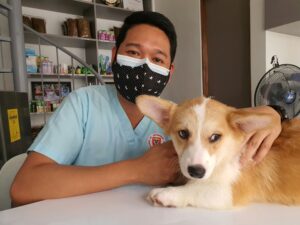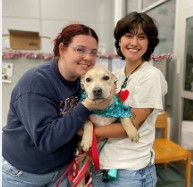[In part two of our series celebrating National Spay-Neuter Awareness Month, we invited our partner Operation Kindness to write on the impact of spaying and neutering animals in Dallas. If you missed part one, click here to read a perspective about the problem surrounding overpopulation of dogs and cats in our city. The Rees-Jones Foundation remains committed in its efforts to collaborate with key organizations in animal welfare so that communities can be kept safe for animals and residents alike].
Finding the Solution to Pet Overpopulation with Spay/Neuter Surgeries
By Lilly Watson, Operation Kindness
Pet overpopulation and shelter overcrowding are serious and persistent problems both locally in Dallas and on a national level. This difficult reality impacts animal service workers who often encounter dogs and cats who have not been spay/neutered, with the ability to reproduce, and without loving homes.
As dire of a situation as this is, the solution is simple. Spay/neuter surgeries stop the exponential growth of our animal population while protecting our animals from excessive breeding. This February is National Spay/Neuter Month, making it the perfect time for all of us in the community to learn more about the benefits of these surgeries and how we can all play a part in combating the overpopulation of pets.
Here with more information on the subject is Meredith Jones, Chief Community Initiatives Officer of Operation Kindness.
Why is it important to spay/neuter animals?
Spaying or neutering your pet is beneficial not only for your household but also your community! Spaying (female pets) or neutering (male pets) your pet has many medical and behavioral benefits. Research shows that spayed and neutered pets live longer, healthier lives. Spaying eliminates fatal yet preventable infections such as pyometra and decreases the incidence of cancerous breast tumors and neutering can help to prevent testicular cancer.
Spaying or neutering also has many behavioral benefits – several that may make for a more pleasant household! Spayed females do not go into heat; for example, female cats in heat can be very vocal about trying to find a mate and even litterbox-trained cats may urinate around the house while in heat. Neutered male dogs and cats are less likely to roam; even the happiest housepet that has never had an interest in going outside may try to escape, in order to find a female in heat! Additionally, neutered males are less likely to mark their territory within your house.
Within your community, spaying or neutering your pet contributes to decreasing the homeless population of animals. Each year, millions of dogs and cats are euthanized within shelters or suffering on the streets due to the pet overpopulation crisis. By spaying or neutering your pet, you are playing an integral role in not contributing to this crisis. The more pets spayed and neutered within a community, the fewer strays and owner surrenders that we see in our shelters, leading to fewer dogs and cats being euthanized due to a lack of space.
When and where should I get my pet neutered?
High-quality, high-volume spay/neuter clinics are now accessible in many parts of the country. These clinics are not only safe but also employ veterinary professionals who often are specially trained in spay/neuter surgeries. Licensed veterinarians perform the surgeries and veterinary technicians and assistants provide surgical preparation and post-operative care.
Many of the medical and behavioral benefits mentioned above are maximized if your pet is spayed or neutered at a young age; the ASPCA recommends spaying/neutering puppies and kittens as early as 8 weeks of age and 2 pounds, although speaking to a veterinarian about your particular pet is always recommended. Younger pets often recover faster from surgery than older pets and spaying or neutering early may help to prevent some hormone-related behavior challenges.
How accessible is low cost spay/neuter right now with the national veterinary shortage? Should people expect a wait when wanting to get their animals surgery? What are the best resources available if you want to schedule surgery for your animal?
 The national veterinarian shortage is leading to longer wait times and higher costs for spaying or neutering your pet. Additionally, this crisis is leading to longer stays for animals at animal shelters across the country, as many shelters do not have a veterinarian to perform spay/neuter surgeries for adoptable animals.
The national veterinarian shortage is leading to longer wait times and higher costs for spaying or neutering your pet. Additionally, this crisis is leading to longer stays for animals at animal shelters across the country, as many shelters do not have a veterinarian to perform spay/neuter surgeries for adoptable animals.
Operation Kindness’ Community Initiatives team is directly addressing this veterinarian shortage by partnering with over 15 local north Texas animal shelters to provide licensed veterinarians and veterinary technicians and assistants to perform spay/neuter surgeries.
We encourage anyone looking for spay/neuter resources to reach out to your local animal shelter. While shelters are seeing an increased wait time for spay/neuter surgeries, many shelters have pre-adopt or foster-based programs that will allow you to pre-adopt or foster your pet. This would allow you to take him or her home and then bring him or her back to the shelter or a clinic partner for their spay or neuter surgery.
At many shelters, the spay or neuter surgery and many other services such as vaccines and microchips, are included as part of the adoption fee, helping to make spay/neuter surgeries more financially accessible.
If you already have your pet, we still encourage you to contact your local shelter, as well as local full-service veterinary clinics and spay/neuter clinics, for information on spay/neuter resources within your community. You may also want to expand your search to neighboring communities. While the drive may be farther, sometimes clinics have sooner openings in less densely populated areas. Many shelters and spay/neuter clinics are launching mobile clinics and transport programs to reach more clients. Additionally, many full-service veterinary clinics offer spay or neuter surgeries, with the added benefit of establishing a veterinarian-client-patient relationship so that you have a veterinary clinic to take your pet to for future wellness care and services.
Recognizing how the veterinarian shortage is leading to longer wait times and higher spay/neuter costs, many organizations like Spay Neuter Network have launched, with the goal of making veterinary care affordable and accessible for pet owners, so that they do not have to surrender their pet to a shelter or face economic euthanasia. Additionally, veterinary payment options have recently expanded to include Scratchpay, CareCredit, Varidi, and VetBilling options. We recommend discussing all payment plans and options accepted when contacting local clinics.
What is the best thing to do if you see a stray animal in your community?
Look for identification tags or a microchip tag on the animal’s collar and contact the owner to return the animal to its home. Many veterinary clinics will also scan animals for microchips at no cost to help reunite a lost pet with its owner. If you cannot approach or safely contain the animal, please call your local animal services or control. They will gather information from you about the animal so that they may assist. It is important to contact your local animal services or animal control, as that is the first location many owners go to when they have lost their pet.
For more information on Operation Kindness and its lifesaving animal rescue efforts, visit their website.
Share this post:
Category: Original ContentUncategorized
Remember to Whom We Belong By T. Hardie, President For to us a child is born, to…
Children’s Health and UT Southwestern Break Ground on New Dallas Pediatric Campus; Announce $100 Million Donation from…

